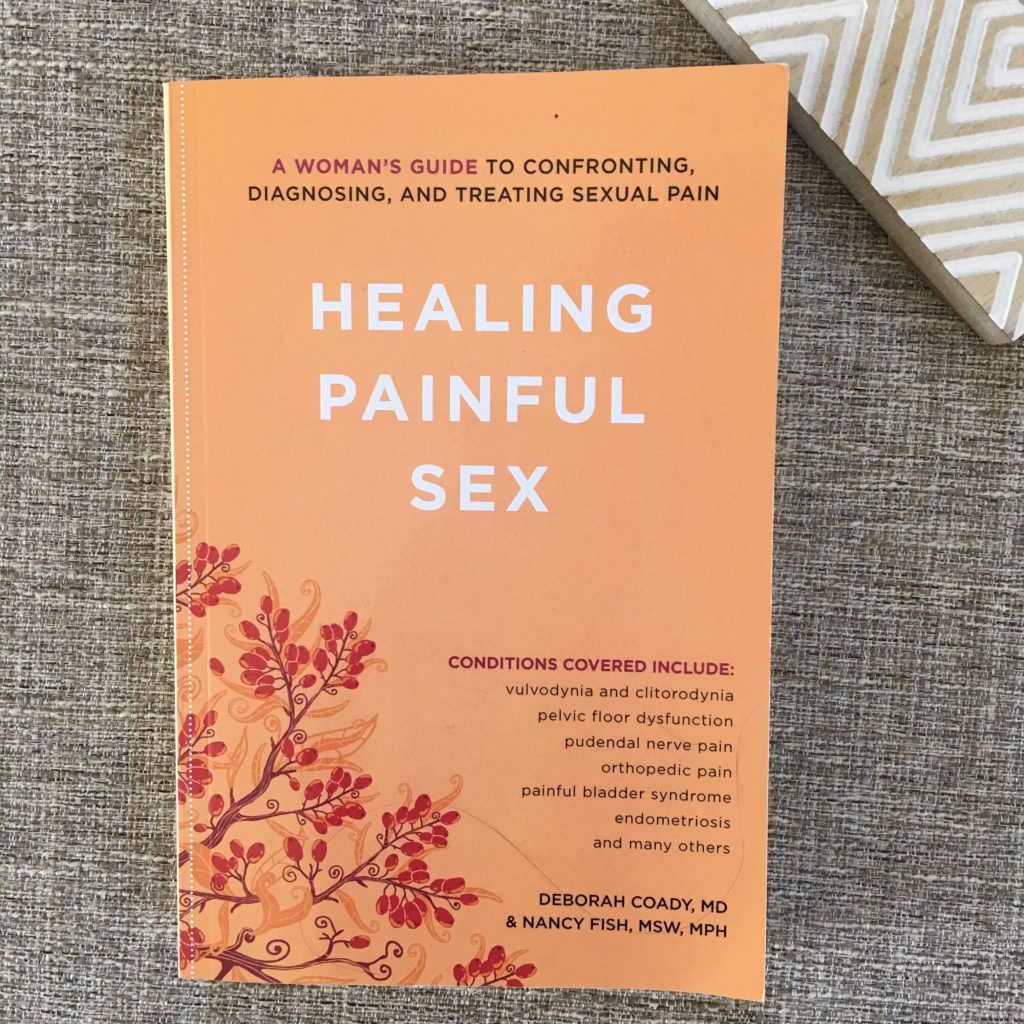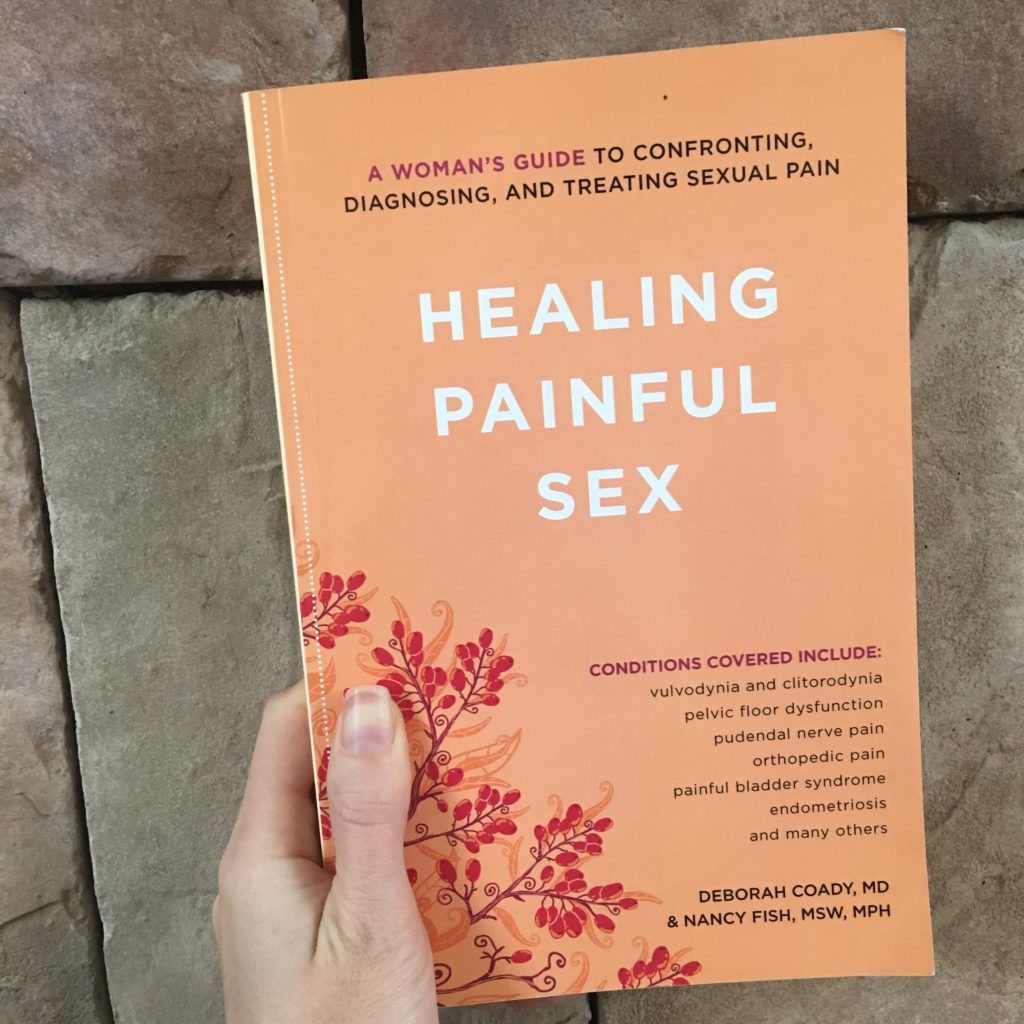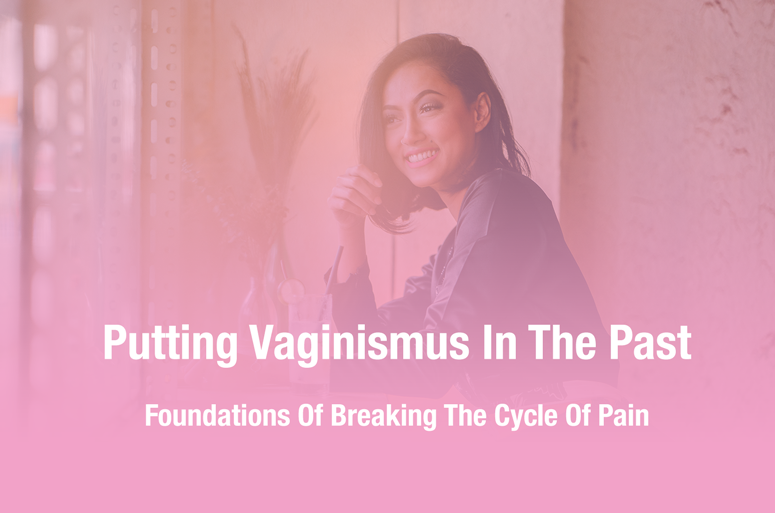Experiences are the essence of life and wisdom…
That’s why I urge you to seek out mentors in life, seek those people who are further ahead on the same path you’re on.
People who have been where you are now. And have moved ahead with joy and excitement.
People with relevant experience!
And there are plenty of those!
Did you know that it’s estimated that 16-20% of all vulva owners have had sexual pain at some point in their lives?

You’re not alone!
This beautifully represented in the book “Healing Painful Sex” by Deborah Coady and Nancy Fish.
It’s a wonderful guide summarizing many different sources of pain in the world of intimacy, including vaginismus.
The authors include many people’s stories including their own personal and professional experiences. I read this book with appreciation for the commitment it took to communicate their years of learning so beautifully!
A special tribute to Deborah, as she’s left her passion and legacy alive in this book, to serve as a memory of her life.

Among many other topics, the authors share their thoughts in detail about the weaknesses they’ve seen in the medical community.
“Many women report having been misdiagnosed, given inappropriate medication, treated insensitively, or told their pain was psychosomatic. And based on our experience, when doctors realize they’re unable to provide effective treatment, it’s very rare they can even refer a patient to someone who can.”
Some vulva owners with incorrect diagnoses have even undergone unnecessary surgeries that actually increased their sexual pain or worsened their conditions!
Well, that’s utterly disappointing…
To make sure at least you’re informed going into an appointment, the book also summarizes the main sexual-related conditions.
It provides a helpful guide that you can use to categorize your own symptoms and perhaps even refer to in conversation with YOUR medical professional.
Just so you can tell if your doctor tells you one thing, but what they’re really thinking is…

“To a shocking extent, doctors simply don’t know about sexual pain: how it starts, how it worsens, how to treat it. Deborah is often surprised, when examining a woman who is clearly suffering from a particular condition, to learn that the previous physician misdiagnosed her or offered no diagnosis at all. Clearly, many doctors simply don’t know what to look for or how to interpret their findings.”
I mean whether this is acceptable or not, patients often expect their physicians to be all-knowing.
But…
“Most doctors feel very uncomfortable admitting they don’t know something! Many physicians apparently prefer to offer an incorrect diagnosis than to not give one at all, which would disappoint the patients and themselves.”
Disappointment of unnecessary procedure coupled with confusion and additional pain…

Even the authors state that…
“Instead of recognizing they don’t have the necessary knowledge to diagnose you and therefore referring you to someone who can, doctors often insist that your pain is all in your head!”
So it only makes sense that vulva owners begin to blame themselves!
“Given that women with sexual pain are dependent upon doctors to cure them, the idea that a doctor might not be able to help-that he or she might not even be competent to treat you – is very frightening indeed. Better to believe that you are the problem and leave the doctor to their godlike authority.”
Mary shares that…
“When no one can help you, and everyone insists that your problem doesn’t exist, it’s very hard to stay with what you know to be true.”
“Of all the upsetting things that happened to her in the course of her illness, she considers one of the worst to be the way she allowed the doctor to “get inside her head” and cause her to doubt her own perceptions. “Feeling like I was crazy – or at least wondering whether I was – that was a nightmare,” she says.”
The authors thus urge you not to take the bad treatment personally.
They explain that…
“When you’re entering the medical system, you’re entering a whole culture that’s not set up to help people with sexual pain. If a doctor can’t talk about sex, that is his or her own hang-up; it’s not your fault. If a doctor suggests a treatment that doesn’t work, then that was the wrong treatment; again, not your fault. If a doctor has no clue what the problem is, then that’s because of his or her medical ignorance; once again, not your fault”.

I have personally seen a family doctor become a little embarrassed talking about sexual pain…
But in fact, YOU are the ones who has reasons for not wanting to talk about sexual pain, and it would be much nicer if the doctor can be compassionate instead of creating additional discomfort.
Because this may create the desire to hide your problem even deeper.
You may actually begin to feel as though you’re leading a double life.
“There’s the happy, confident persona you try to present to colleagues, neighbours, and maybe even family, friends, and partners… and then there is the agonized, desperate, terrified person you so often feel like in private.”

Sexual pain can be excruciating and debilitating and it actually has its own unique quality that makes it extra brutal…
“Some of our brain’s pain centres may overlap with the centres for sexual sensation, arousal, and orgasm. Deborah speculates that perhaps that is why sexual pain becomes such an intense, total-body, and deep pain experience – just as orgasm is also such a total-body, deep sensory experience. Sexual pain may be more profound and totalizing than, say, pain in the arm or leg, since the nerve fibres mean to transmit pleasure now transmit pain.“
So how can you reduce the pain?
You must re-wire the brain’s association of intimacy and penetration being painful and scary. First to being painful but not scary, then pain free and not scary, and only then being pleasurable and exciting.
It’s important to be…

Introducing pleasure in your life can drastically speed up the re-wiring of your brain’s association of penetration to pain. The authors say that…
“Orgasm and stimulation in the G-spot raise your pain threshold. So if you can figure out how to get yourself aroused (with or without a partner) and experience orgasm in ways that don’t involve pain, you will actually be improving your condition!”
Mmhmm, pleasure to decrease pain?
Sounds like a plan!
So, what did you think?
What were your experiences in finding a medical professional, if you’ve sought one?

If you’d like to, I welcome you to get your horror stories off your chest, and better yet share your success stories!
Please comment below with your thoughts, questions or objections about anything I mentioned or quoted from the book, “Healing Painful Sex”!

Also, I want to congratulate you for committing to your healing journey by doing your research and reading this!
Starting is the hardest step and that means you’re well on your path to healing! Celebrate that fact today! How about with a little something to help introduce pleasure in your life?
And if you haven’t gotten your hands on my free online course yet, get “Putting Vaginismus In The Past” now.

To your journey to pleasure!
– Katrin, with Love



